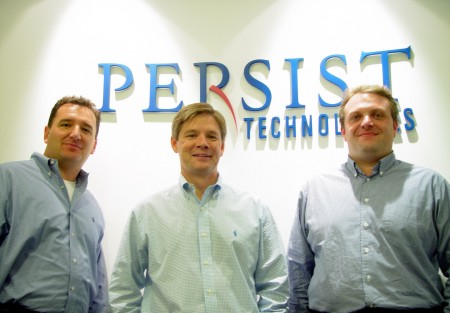PERSIST Helps You Manage Terabytes of Corporate Data
PERSIST Helps You Manage Terabytes of Corporate Data

New Company Pushes Data-Archiving Appliance to Market
The ability to store corporate data electronically can literally give you access to decades of data that's available in a form that can be copied to a disk. Digging through dusty files and lugging around piles of paper when you need legacy information may be a thing of the past, but those electronic files take up space as well. Often, rather than having electronic data archives available via the corporate network and your office computer, they too are stored away in a file room - the key difference and advantage being that they take up less space and perhaps last longer on disk or tape backup than they would on paper.
PERSIST Technologies Inc. thinks it has an answer to the challenge of growing data storage and retrieval needs in large companies. Their Application Content Solution product uses networked storage devices called server blades (small, cost-efficient, low-power network server computers), along with proprietary software, to store, index, and retrieve reference digital content. The company, which recently emerged from parent company Zantaz as a separate organization, leased 10,000 square feet of office and development space at 3875 Hopyard Road in Hacienda not long ago, and currently has over 30 employees. Because PERSIST was spun out of a fellow Hacienda tenant, a large percentage of its employees were local and within commuting distance into Pleasanton. In addition, the CEO, CTO, and other corporate officers live here. "PERSIST recognizes the level of talent that is now available and growing in locations such as Pleasanton," says Gary Lyng, Pleasanton resident and vice president of product management and alliances for PERSIST.
PERSIST is now in the "early adopter" stage with its Application Content Solution product, with more than ten large companies using it to store and retrieve from 10 to 280 terabytes (1,024 gigabytes) of data. "Initially, our focus is on active email archiving," Lyng says. "But outside of that, our technology basically enables you to have any kind of application front end. So, it could be email, it could be voice, it could be video, but whatever form the data is in, our software lets you search and retrieve the information very rapidly." The software, which includes a search engine, runs across rack-mounted server blades to create a storage "appliance."
PERSIST provides the software, but intends to work closely with leading computer hardware and software vendors to deliver a well-rounded solution to users. In the end, PERSIST thinks their solution can ultimately be less expensive than more traditional means of storing data. "There's a large cost in figuring out which pieces of the storage system to build and how to integrate them," Lyng says. "Then, the corporation typically has to write an application on top of all that to make things work. That's really technology to fix technology. What we do is we deliver things lock, stock, and barrel from a software perspective." PERSIST's system makes use of redundancy (keeping the same data in multiple places) to keep data safe, and because blades are really small-format server computers, the system's processing power increases as storage capacity increases.
Because nearly every type of document businesses create nowadays is electronic, storage and data access needs are increasing daily. Many large companies are also keenly aware of the challenge of complying with SEC storage regulations which state, among other things, that certain types of organizations must keep archived emails and attachments and that they must be easily retrievable. With these factors to consider, solutions like those provided by PERSIST may just keep us from digging through stacks of archived disks and tapes - just as computer networks virtually eliminated the need for filing cabinets.
Photo: (L to R) VP of product management Gary Lyng, CEO Paul O'Brien, and VP of engineering Philippe Ciampossin of PERSIST.
Also in this issue...
- PERSIST Helps You Manage Terabytes of Corporate Data
- Huntington Learning Center Helps Students Excel
- Business Bits
- Executive Profile: Ron Beasley, SafeAmerica Federal Credit Union
- Goal Line Brings a Hollywood Caliber Production Facility to Hacienda
- Tri-Valley Herald: Keeping Locals Informed for 128 Years
- Local Organizations Provide Business Services and Support to Tri-Valley Enterprises
- Pleasanton Business Expo 2002 Helps Businesses Make Connections
- TTEC Supports High-Tech Entrepreneurs in the Tri-Valley
- Writers' Roundtable Lets Authors and Poets Share Their Wares
- 2002 Hacienda Food Drive
- Hacienda Index




